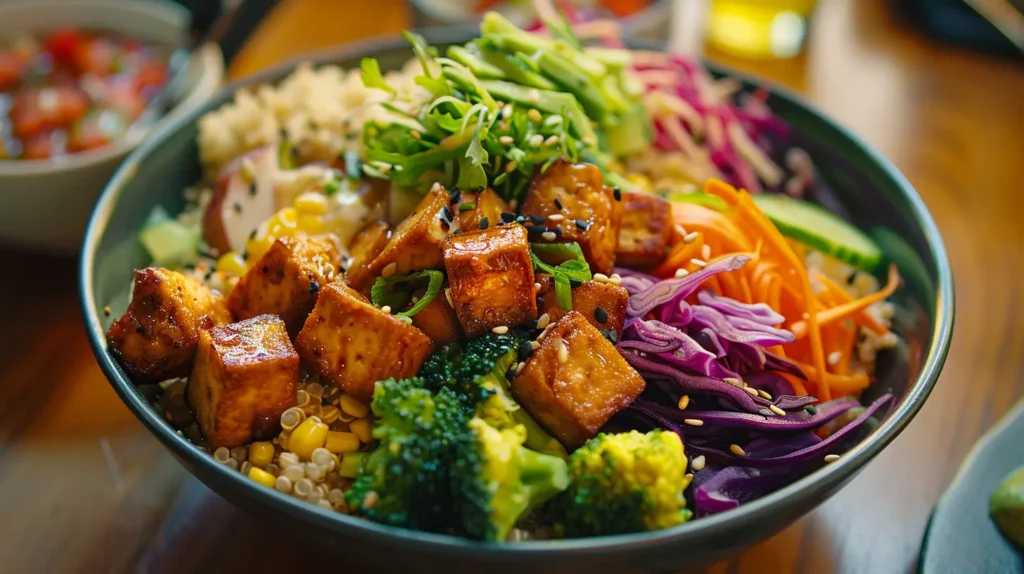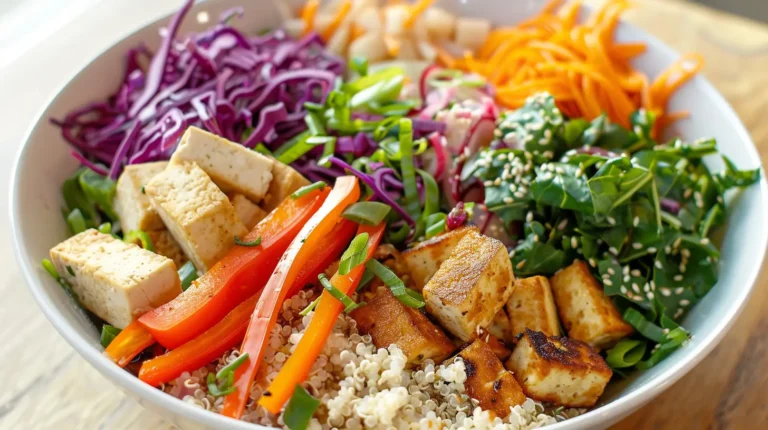Table of contents
Introduction
Vegan protein intake is a crucial aspect of a plant-based diet, ensuring that individuals meet their daily protein needs for vegans. Understanding the significance of incorporating adequate vegan protein sources into meals is essential for overall health and wellness.
According to nutrition experts, the recommended daily intake of protein for an average adult is approximately 0.8 grams per kilogram of body weight. However, for those following a vegan lifestyle, the protein requirements may vary slightly due to the exclusion of animal products. It is important to be aware of the specific protein needs for vegans and how to effectively meet them through plant-based sources.
In this article, we will delve into the various aspects of vegan protein consumption, including sources, calculations, expert recommendations, and real-life case studies. By the end of this comprehensive guide, you will have a better understanding of how to optimize your vegan protein intake to support your health and well-being.
Recommended Daily Allowance of Protein
Consuming enough vegan protein daily is essential for overall health and wellness. The recommended daily allowance of protein varies depending on factors such as age, gender, and activity level. For the average adult, the general guideline is around 0.8 grams of protein per kilogram of body weight. However, for individuals following a vegan diet, especially those who are more active or have specific health goals, their protein needs may be higher.
To determine how many grams of vegan protein you need per day, it is crucial to consider your individual requirements. Factors such as muscle mass, physical activity, and overall health play a role in determining the right protein intake. For example, a sedentary individual may need less protein than a competitive athlete.
When calculating your daily protein needs as a vegan, you can use the following formula: body weight (in kilograms) x recommended protein intake (0.8 grams). This simple calculation can give you a rough estimate of how much protein you should aim to consume each day. However, it’s always best to consult with a healthcare professional or nutritionist for personalized advice.
For more detailed information on plant-based protein requirements and how to meet your daily protein goals on a vegan diet, check out this informative article on The Benefits of Hemp Protein for Vegan Diets.
Sources of Vegan Protein

Consuming vegan protein is essential for meeting one’s dietary needs, and there are various plant-based sources to choose from. These sources not only provide the necessary protein but also offer a wide range of other nutrients important for overall health.
- Legumes: Beans, lentils, and chickpeas are excellent sources of vegan protein, packing a significant amount of this nutrient per serving. They are versatile and can be easily incorporated into various dishes.
- Nuts and Seeds: Almonds, chia seeds, and hemp seeds are rich in plant-based protein. They can be sprinkled on salads, added to smoothies, or enjoyed as a snack.
- Whole Grains: Quinoa, brown rice, and oats are examples of vegan protein sources that also provide fiber and other essential nutrients. These grains can be the base of hearty, protein-packed meals.
- Soy Products: Tofu, tempeh, and edamame are all derived from soybeans and are considered complete protein sources for vegans. We can use them in a variety of recipes to increase protein intake.
- Seitan: Made from wheat gluten, seitan is a high-protein meat substitute favored by many vegans. It can be seasoned and cooked in various ways for a protein-rich meal.
By including a variety of these vegan protein sources in your diet, you can ensure you are meeting your daily protein needs while enjoying delicious and nutritious meals.
You can also check our detailed guide about What Vegan Snacks Are High In Protein
Calculating Protein Needs
When it comes to vegan protein intake, understanding how many grams of vegan protein per day you need is crucial for meeting your dietary requirements. Factors that influence your protein needs include your age, gender, weight, activity level, and overall health status.
To determine your daily protein intake, a simple formula can be used: multiply your weight in kilograms by a specific multiplier based on your activity level. For sedentary individuals, the multiplier is 0.8 grams per kilogram of body weight. Those who are more active may need up to 1.2 grams per kilogram.
For example, a sedentary vegan woman weighing 60 kilograms would need approximately 48 grams of protein per day. On the other hand, a vegan man who is highly active and weighs 80 kilograms may require around 96 grams of protein daily.
By understanding your specific protein needs and incorporating a variety of plant-based protein sources into your meals, you can easily achieve your daily protein goals on a vegan diet. Monitoring and calculating your protein intake ensures that you maintain optimal health and energy levels while following a vegan lifestyle.
Expert Recommendations
When it comes to vegan protein needs, it’s essential to seek advice from experts in the field of nutrition. Dietitians and nutritionists can provide valuable insights into crafting a well-rounded plant-based diet that meets all your protein requirements. They may suggest incorporating a variety of vegan protein sources such as legumes, nuts, seeds, and whole grains to ensure a balanced intake.
Experts also emphasize the importance of planning your meals to include a sufficient amount of protein in each serving. We can achieve this by incorporating protein-rich foods like tofu, tempeh, quinoa, and lentils into your daily meals.
Additionally, nutrition professionals may provide valuable tips on how to optimize your digestion and absorption of plant-based proteins. They might recommend pairing certain foods together to create complete protein sources or advise on the best times to consume protein-rich meals throughout the day.
Supplements for Vegan Protein
When following a vegan diet, it can sometimes be challenging to meet your daily protein requirements through whole foods alone. This is where vegan protein supplements can play a helpful role. These supplements are typically derived from sources like pea, soy, or hemp, providing a convenient way to increase your protein intake.
It’s essential to note that while supplements can be beneficial, they should not replace a well-rounded diet rich in plant-based protein sources. Instead, they should complement your meals and snacks to ensure you’re getting an adequate amount of protein each day.
Vegan protein supplements come in various forms, including powders, bars, and shakes. They can be particularly useful for individuals with high protein needs, such as athletes or those looking to build muscle mass. When considering supplementing with vegan protein, it’s crucial to choose products that are high-quality and free from additives or artificial ingredients.
If you find it challenging to meet your protein needs through food alone, a vegan protein supplement may be a convenient and effective solution. However, always remember that supplements should not be a substitute for a diverse and balanced plant-based diet. Consult with a nutritionist or healthcare provider before adding any new supplements to your daily routine to ensure they align with your individual needs and health goals.
FAQ
How many grams of vegan protein should I aim to consume per day?
The recommended daily intake of protein for the average adult is around 46 grams for women and 56 grams for men. However, individual protein needs can vary based on factors like age, sex, activity level, and overall health. As a vegan, it’s important to ensure you’re getting enough protein from plant-based sources to meet your daily requirements.
What are some good sources of vegan protein?
There are many plant-based foods that are rich in protein, including legumes such as beans, lentils, and chickpeas, tofu and tempeh, nuts and seeds like almonds and chia seeds, whole grains such as quinoa and brown rice, and plant-based protein sources like pea protein and hemp protein.
Can I meet my protein needs on a vegan diet without supplements?
While it is possible to meet your protein needs solely through whole food sources on a vegan diet, some individuals may benefit from incorporating protein supplements to ensure they are getting enough protein. Eespecially if they have increased protein requirements due to factors like intense physical activity or specific health conditions.
How can I plan my meals to ensure I’m getting enough protein as a vegan?
Meal planning is key to meeting your protein needs on a vegan diet. Include a variety of protein-rich foods in your meals, such as beans, tofu, nuts, seeds, and whole grains. Aim to have a source of protein at every meal and snack to ensure you’re meeting your daily protein goals.
Are there any common mistakes to avoid when trying to meet protein needs on a vegan diet?
Some common mistakes to avoid include relying too heavily on processed vegan foods, not eating a variety of protein sources, and not paying attention to portion sizes. It’s important to balance your diet with a mix of protein-rich whole foods and pay attention to your overall intake to ensure you’re meeting your protein needs as a vegan.

